1. John Stuart Mill
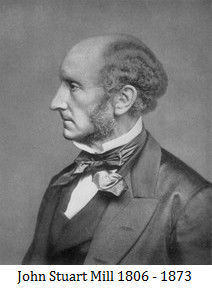
John Stuart Mill 1806-1873. John Stuart Mill 1806-1873. He was born in England and lived most of his life there. He died in Avignon in France.
John Stuart Mill was a member of the Bri-tish Parliament and was the banner bear-er of the Liberal Left. For one hundred and fifty years he has been the great role model of the English left. He was a lead-ing personality in the intellectual life and contributed to the disciplines of logic, eco-nomics, ethics and political philosophy. Today he is best known for his easy, "On Liberty", in which he defends individu-alism and freedom of speech embodied in three principles, which will improve and complete democracy:
- Freedom to think and express oneself and discuss.
- Freedom for the individual to cultivate interests that do not harm others.
- There must be limits to the authority of society over individuals.
He writes in "On Liberty": "No society in which these liberties are not, on the whole, respected, is free, whatever may be its form of government; and none is completely free in which they do not exist absolute and unqualified. The only freedom which deserves the name, is that of pursuing our own good in our own way, so long as we do not attempt to deprive others of theirs, or im-pede their efforts to obtain it. Each is the proper guardian of his own health, whether bodily, or mental or spiritual. Mankind are greater gain-ers by suffering each other to live as seems good to themselves, than by compelling each to live as seems good to the rest."
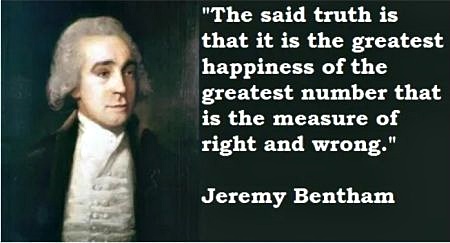
Jeremy Bentham and the utilitarianism's motto: "The greatest happiness of the greatest number". Photo: In Defense of Utilitarianism.
John Stuart Mill was the son of the Scottish philosopher and historian James Mill, who had great ambitions on behalf of his son. He was educated at home in London by his father and did not go to school like other children. He can almost be described as a prodigy. At the age of three, he learned the Greek alphabet and long lists of Greek words. At the age of eight he learned arithmetic and had read the fables of Aesop, the Anabasis of Xenophon, and all of Herodotus in Greek. The following year he read po-litical economics by Adam Smith and David Ricardo.
According to the philosophy of utility, every action in our lives is associated with both happiness and pain. When happiness exceeds the pain, we get "utility," which we prefer.
It can be compared to an economic act, which is associated with both reve-nue and costs. When revenue exceeds costs, we make a profit, which we prefer.
The guiding principle in political decisions should therefore be to choose such solutions that will provide the greatest possible "utility" to as many people as possible.
Like his father's friend, Jeremy Bentham, he did not recognize "natural rights," including human rights.
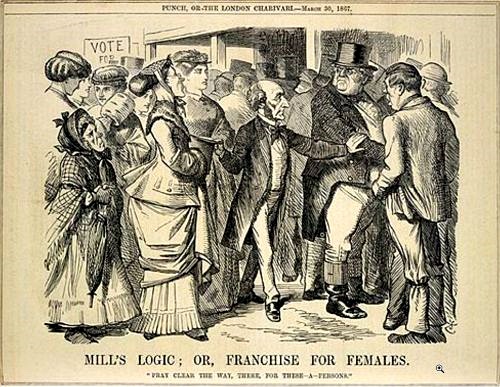
Satire on John Stuart Mill's support for the women's cause. He pushes the men aside and leads the women forward. Apparently, Mill was not a phy-sically big man. Photo National Archives Wikipedia.
In 1831, when he was 25 years old, he fell in love with Harriet Taylor, whom he met at a din-ner party.
However, she was al-ready married to businessman John Taylor, who disapproved of his wife's relationship with John Stuart Mill and forbade her to see him. However, after a few years, he was softened and allowed them to see each other occasio-nally. It is assumed that Mills and Harriet's relationship during this period was purely platonic.
John Taylor died 18 years later - in 1849. Two years later, when Mill was 45 years old, they finally married.
After his first meeting with John Stuart Mill, Harriet became a philosopher and women's advocate. She wrote a number of works on women's rights, ethics, tolerance and marriage. Mill herself mentions that she had a great influence on his writing.
Mill had an idealistic view of the opposite sex. In the book "Subjetion of Wo-men" he argued for legal and social equality between men and women. He wrote that: "the legal subordination of one sex to the other" is "wrong in it-self and is now one of the greatest obstacles to human progress"
To Mill's great sorrow, Harriet died of tuberculosis after only four years of marriage.
2. Freedom of Thought and Freedom of Speech
The phrase "Marketplace of Ideas" is undoubtedly inspired by Mill. He de-clared himself in favor of "absolute freedom of opinion and sentiment on all subjects, practical or speculative, scientific, moral, or theological." He be-lieved that free competition between ideas is the best way to separate lies from truth.
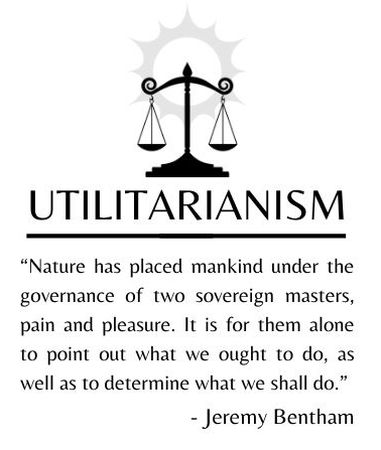
Fra hjemmesiden Utilitarianism Resources.
Mills did not write this because he thought it would be a pity for some that their opinions were suppres-sed, or because he thought it was fair that everyone should be allow-ed to give their opinion. No, loyal to his philosophy of utility, he believ-ed that such a marketplace of ideas and attitudes with lively supply and demand, where all ideas would be tested against a relentless argu-mentation, would create an optimal social development - because so only the best and truest ideas would survive - it would create the cause of "The greatest good for the greatest number".
The struggle between freedom and authority is a striking feature of the hi-story of ancient Greece, Rome and Europe. "The aim, therefore, of patriots, was to set limits to the power which the ruler should be suffered to exercise over the community; and this limitation was what they meant by liberty.", Mill wrote.
He explained further: "It was attempted in two ways. First, by obtaining a re-cognition of certain immunities, called political liberties or rights, which it was to be regarded as a breach of duty in the ruler to infringe, and which, if he did infringe, specific resistance, or general rebellion, was held to be justi-fiable. A second, and generally a later expedient, was the establishment of constitutional checks; by which the consent of the community, or of a body of some sort supposed to represent its interests, was made a necessary condition to some of the more important acts of the governing power."
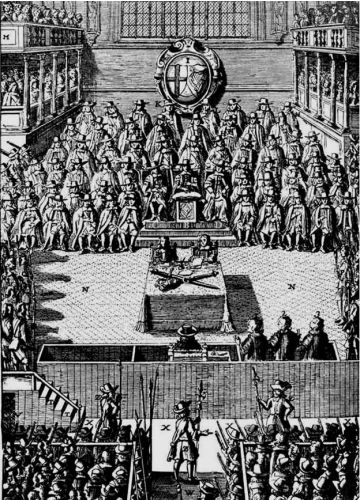
English Parliament under Charles 1. (1600 - 1649) Photo Historic UK.
"A time, however, came in the pro-gress of human affairs, when men ceased to think it a necessity of na-ture that their governors should be an independent power, opposed in inte-rest to themselves. It appeared to them much better that the various magistrates of the State should be their tenants or delegates, revocable at their pleasure. In that way alone, it seemed, could they have complete security that the powers of government would never be abused to their disadvantage."
Mill comes then with his real-tidings that should make him known as the man who completed democracy: "The will of the people, moreover, practi-cally means, the will of the most numerous or the most active part of the people; the majority, or those who succeed in making themselves accepted as the majority; the people, consequently, may desire to oppress a part of their number" - "and in political speculations "the tyranny of the majority" is now generally included among the evils against which society requires to be on its guard."
Tyranny of the majority is far more comprehensive than an autocrat: "it prac-tises a social tyranny more formidable than many kinds of political oppres-sion, since, though not usually upheld by such extreme penalties, it leaves fewer means of escape, penetrating much more deeply into the details of life, and enslaving the soul itself."
Mill explains in more detail how the majority of the people may feel entitled to suppress minority ideas: "People are accustomed to believe and have been encouraged in the belief by some who aspire to the character of philo-sophers, that their feelings, on subjects of this nature, are better than rea-sons, and render reasons unnecessary. The practical principle which guides them to their opinions on the regulation of human conduct, is the feeling in each person's mind that everybody should be required to act as he."

Book burning in Germany in 1933. Photo Bibliomirok.
Mill argues that such sup-pression of the opinions of a minority is completely un-acceptable: "Let us sup-pose, therefore, that the govern-ment is entirely at one with the people, and never thinks of exerting any power of coercion unless in agreement with what it conceives to be their voice. But I deny the right of the people to exercise such coercion, either by them-selves or by their government. The power itself is illegitimate. The best go-vernment has no more title to it than the worst."
His first argument against the suppression of ideas and attitudes is that the suppressed meaning may be true: "But the peculiar evil of silencing the ex-pression of an opinion is, that it is robbing the human race; posterity as well as the existing generation; those who dissent from the opinion, still more than those who hold it. If the opinion is right, they are deprived of the oppor-tunity of exchanging error for truth."
But, even if the oppositional idea is untrue, there will be great benefits asso-ciated with bringing it to light and discussing it, as the meaning of the ruling truth itself may otherwise be in danger of being lost or weakened and de-prived of its vital impact on human character and behavior. When people never have to defend the prevailing opinion - whether it is true - against criti-cism, it will become "dead dogma", "and preventing the growth of any real and heartfelt conviction, from reason or personal experience".
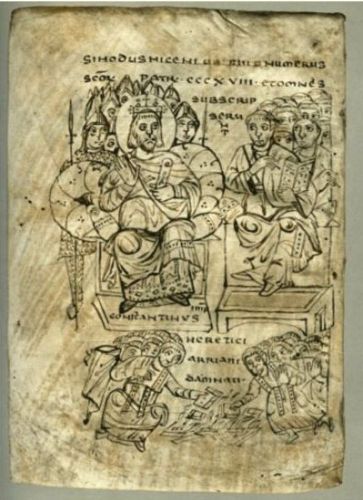
Emperor Constantine I monitors that Aryan priests are forced to burn their books. Almost all Ger-manic migration peoples, Goths, Burgundians, Vandals and Thur-ingians, were Aryans. The Arian faith was characterized by the belief that the Father (God) is eternal and uncreated, while the Son (Jesus) is derived from the Father and has not always existed and that the Father is above the Son, while the Catholic Church believes in the Trinity, which is characterized by the that God is one and at the same time three, which is the Father, the Son and the Holy Spirit. The details of Arianism are lost forever because their faith was effectively sup-pressed by the Catholic Church and their books were burned.
"The most intolerant of churches, the Roman Catholic Church," Mill writes, "even at the canonization of a saint, admits, and listens patiently to, a "devil's advocate." The holiest of men, it appears, cannot be admitted to posthumous honors, until all that the devil could say against him is known and weighed. If even the Newtonian philo-sophy were not permitted to be questioned, mankind could not feel as com-plete assurance of its truth as they now do. The beliefs which we have most warrant for, have no safeguard to rest on, but a standing invitation to the whole world to prove them unfounded. If the challenge is not accepted, or is accepted and the attempt fails, we are far enough from certainty still; but we have done the best that the existing state of human reason admits of; we have neglected nothing that could give the truth a chance of reaching us: if the lists are kept open, we may hope that if there be a better truth, it will be found when the human mind is capable of receiving it; and in the meantime we may rely on having attained such approach to truth, as is possible in our own day. This is the amount of certainty attainable by a fallible being, and this the sole way of attaining it."
3. PRO Democracy
Freedom of speech is a fundamen-tal right and a precondition for a democracy.
The vast majority of statements are still permitted in Denmark. However, Danish politicians have entered into international treaties which restrict freedom of expres-sion with the intention of counter-acting violence, hatred and abuse.
"International Covenant on Civil and Political Rights" contains spe-cific restrictions on statements. Ar-ticle 20, para. 2, states that any in-citement to national hatred, racial hatred or religious hatred, which incites discrimination, hostility or violence, shall be prohibited by law. The treaty was ratified by Denmark in 1972.

It is dangerous to speak out. Photo Lurantol Live Journal.
"Committee on the Elimination of Racial Discrimination" under the UN is designed to prevent the spread of harmful ideas. It obliges the state parties to take measures to combat any incitement to or exercising of racial discrimination. In particular, states are obliged to criminalize the spread of ideas based on preconceived notions of racial superiority or racial hatred. Encouragement of discrimination, acts of violence and incitement to violence against persons of an-other ethnic origin. The treaty was ratified by Denmark in 1971.

Charlie Hebdo's drawing of the drowned Kurdish boy, Aylan Kur-di, lying on a Turkish beach - his five-year-old brother also drowned. "So close to the goal" is written above him. A sign resembling an advertise-ment for McDonalds reads: "Promoti-on! 2 children's menus for the price of one".
A photo of the drowned boy went around the world and was without problems exposed thousands of times, creating global sympathy with the Muslim immigrantion into Europe.
However, today, several Danish debaters are accused under threat of prison sentences for linking to photos showing victims of Muslim terror. Photo Twitter.
"European Convention on Human Rights" in principle, calls on citi-zens to have freedom of expres-sion, but in a paragraph 2 it gives national governments carte blan-che to restrict it as needed: "The exercise of these freedoms, since it carries with it duties and respon-sibilities, may be subject to such formalities, conditions, restrictions or penalties as are prescribed by law and are necessary in a demo-cratic society, in the interests of national security, territorial integrity or public safety, for the prevention of disorder or crime, for the pro-tection of health or morals, for the protection of the reputation or rights of others, for preventing the disclosure of information received in confidence, or for maintaining the authority and impartiality of the judiciary."
"European Court of Human Rights" has in a large number of cases ta-ken a stand on the issue of encou-raging hatred versus freedom of expression. It has thus rejected a complaint of violation of freedom of expression, as complainants had published a series of articles con-taining hate speech about Jews, which was contrary to the values of the Convention on Tolerance and Non-Discrimination.

Lars Løkke Rasmussen took part in the Marakesh konference as Danish prime minister. Photo nv.ua.
As the Prime Minister of Denmark Lars Løkke Rasmussen accepted in 2018 the Marrakech Treaty, which is the controversial UN trea-ty "Global Compact for Safe and Orderly Migration", which is sup-posed to open up for emigrants from Africa to Europe who do not have to describe themselves as refugees. The Danish People's Party was the only party in the par-liament that was opposed to the treaty, which the party believed will open up for more migrants from Africa and the Middle East. The treaty further obliged the signatory states to further restrict freedom of expression by: "increasing aware-ness of the fight against xenopho-bia, racism and discrimination: the Parties will strive to combat these phenomena and promote a balan-ced narrative on migration and dia-sporas, based on facts and high-lights their positive contributions to the development of communities in countries of origin, transit and de-stination."
The "2008 EU Framework Deci-sion" on Xenophobia obliges mem-ber states to criminalize public in-citement to violence and hatred of persons or groups defined on the basis of race, color, religion, origin, nationality or ethnicity. Therefore, the group of protected persons has been extended in relation to the Convention on Racial Discrimina-tion to also include persons with a religious affiliation.
Furthermore, the framework deci-sion criminalizes "public defense of or denial of genocide, crimes a-gainst humanity or war crimes committed by these persons and groups". The Framework Decision obliges Denmark to set up effec-tive sanctions which are propor-tionate to the infringement and have a deterrent effect.

One can not speak out about everything. Photo Natural News.
In 2016, the European Commis-sion partnered with Facebook, Twitter, YouTube and Microsoft to combat hate speech online. With the so-called Code of Conduct, the IT companies undertook to review reports of hate speech on their platforms and respond on illegal content within 24 hours. The par-ties define illegal hate speech ba-sed on the 2008 EU Framework Decision on Xenophobia and Ra-cism and related criminal law. The censorship thus includes public in-citement to violence or hatred di-rected against a group of persons or a member of such a group, which is defined by reference to ra-ce, color, religion, national or eth-nic origin.
The Council of Europe's "Conven-tion on Cybercrime" - last edited with an additional protocol in 2003 regulates hate speech motivated by racism and xenophobia. It re-quires Member States to crimina-lize racist or xenophobic state-ments on the Internet. Denmark has ratified both the Convention itself and the Additional Protocol.

"Free speech is not an absolute human right" says prominent Facebook censorship board member and former premier of Denmark Helle Thorning-Schmidt. Foto Keywordbasket.
The European Parliament has lately (07-21) by an overwhelming majority decided to repeal their "Directive on privacy and electronic communications" by that network providers should be allowed to read all private e-mails and chats and hand over the content to the police upon request. Suspicious behavior is not a requirement, they only need to declare that they are looking for child pornography.

Words can kill. Photo Yvision.kz.
There is no such thing as freedom of speech. Every idea is an incen-tive; every word is potentially a battle cry. There can be no real context in which speech is free. Speech is never free from state pressure; there are always limits to what is allowed to say. Speech al-ways has consequences; it promo-tes some interests over others; words mean something. Words can call for violence - Words can kill!
CONTRA Democracy
The Danish politicians have soa-ked the country's legislation with international treaties to such an extent that freedom of expression has become a mere theoretical-philosophical concept.

international treaties. Photo Instagram.
Locke's - and Mill's - theory say that the government is merely a trusted secretary. Mill wrote: "It ap-peared to them much better that the various magistrates of the Sta-te should be their tenants or dele-gates, revocable at their pleasure."
Many passages in the American Declaration of Independence and Constitution such as "All men er cre-ated equal", "life, liberty and the pursuit of happiness" and "we hold these truth to be self-evident" are copied more or less directly from Locke's "Two Treatises".
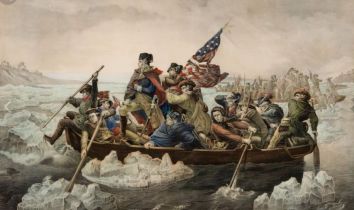
George Washington crosses the Delaware River in the middle of winter during the American Re-volution. Painting by Emanuel Leutze.
The American Revolution became the model for the French Revolu-tion in 1789, which in turn inspired other European peoples to create democratic constitutions, including Denmark. It can thus be said that John Locke was the architect - at least the most important architect - behind today's democratic consti-tutions.
The most important democratic e-lement in Locke's - and in part Mill's - theory is his attitude to-wards government. Society is cre-ated to eliminate the shortcomings of the state of nature. When pe-ople leave the state of nature and join the pact of society, they sur-render the right to punish to a lea-der whom they appoint. But the crucial factor that Locke highlights here is that the leader - the go-vernment - is appointed by the people and therefore accountable to them. As he says: "The whole purpose of government is to make laws for the regulation and preser-vation of property and for the de-fense of society against external aggression, all this only for the common good."
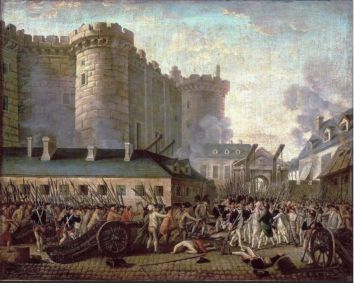
The attack on of the Bastille which started the French Revo-lution. Photo Pinterest.
Locke's and Mill's theory is, so to speak, that government is merely a trusted secretary. We have en-trusted him with the authority to do the things that we find difficult or impossible to do ourselves, just as we can authorize a secretary to take care of our business when we are busy with other things. But if the secretary abuses our confiden-ce - perhaps commits embezzle-ment - we can fire him. And if the government abuses our trust by usurping our legitimate authority and authority, we can dismiss it.
The principle of a true democracy is thus that it is the people who sit at the end of the table. And once the boss has spoken, the govern-ment just has to clap its heels to-gether and say "yes boss".
Therefore - I immediately will come to the relevant point - In a demo-cracy, it must be the people - the boss in our parable - who makes the crucial long-term decisions, and it is extremely important that it makes the right ones. Therefore, the people must have access to all the material that may be relevant, including all books, articles and photographs that illustrate - whet-her it may seem offensive to some - what really happened and what was written and said.

Censorship. Foto keamanan siber -Magdalene.
If the government introduces guar-dians for the people and only shows them the material that be-nefits themselves - as is the case with restrictions on freedom of ex-pression - then the people's tru-sted secretary had abused our trust and robbed the people of their legitimate power and autho-rity.
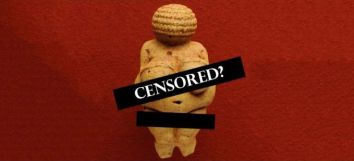
Censorship. Foto Trkeljanje.
That is exactly what all Western governments have done. But they themselves believe that they have clean hands because they have outsourced censorship, manipu-lation and misinformation to social media, privately owned newspa-pers - which they do support finan-cially with public funds - and state-owned and state-funded television channels.
It is not only the government that suppresses freedom of expres-sion. The politicians have allowed the enemy free access into the country - any critic of the Islamic immigration and Islam itself will expose himself and his family to the revenge of the Muslims.

Muslims burn "The Satanic Ver-ses" by Salman Rushdie during a demonstration. Photo Readers Door.
In 1988, Salman Rusdie published the novel, "The Satanic Verses", in which in a dream scene it is sug-gested that some of the verses in the Qur'an were written by Satan. As a result, Iran's then-leader Aya-tollah Khomeini issued a fatwa on Rushdie containing a death sen-tence for blasphemy. The fatwa has never been withdrawn or re-pealed, and in 2016, the Iranian state radio stations raised the bounty. Ever since, Salman Rusdie has lived underground. It is said that today he lives in the United States protected by security ser-vices.
In October 2020, the French tea-cher Samuel Paty used a picture of Muhammad in his teaching of history to illustrate the concept of freedom of speech. Subsequently, he was attacked and beheaded in open street by an aggrieved Mus-lim.
On February 13, 2008, 17 Danish newspapers re-printed Kurt We-stergaard's original Muhammad drawing. But Jyllandsposten, whe-re the drawing was originally prin-ted in 2005, did not reprint it. A re-presentative of the newspaper ex-plained that they simply did not da-re for the sake of their employees.

One must speak out with caution. Photo Youtube.
There is not much to suggest that any mainstream media has any real desire to criticize Muslims and the Muslim immigration. But even if they were to have this wish, they probably would not do it, because it would necessitate such a high cost of security and surveillance that it would probably exceed the financial capacity of most of the newspapers.

Governments' goal of censorship is said to be to protect citi-zens from being emotionally abused. Photo Spookblog.
Words and action belong to diffe-rent categories. God created the world by uttering words. "Be light," He said, and then became light. But it is not allowed ordinary mor-tals to make things happen simply by uttering words. Words are not actions, but can be used to nego-tiate, discuss and consider which actions we prefer.

E-mail spying. Photo spayte - livejournal.com.
4. Individualism
Mill begins the section on individual freedom: "Such being the reasons which make it imperative that human beings should be free to form opini-ons, and to express their opinions without reserve; and such the baneful consequences to the intellectual, and through that to the moral nature of man, unless this liberty is either conceded, or asserted in spite of prohibi-tion; let us next examine whether the same reasons do not require that men should be free to act upon their opinions - to carry these out in their lives, without hindrance, either physical or moral, from their fellow-men, so long as it is at their own risk and peril."
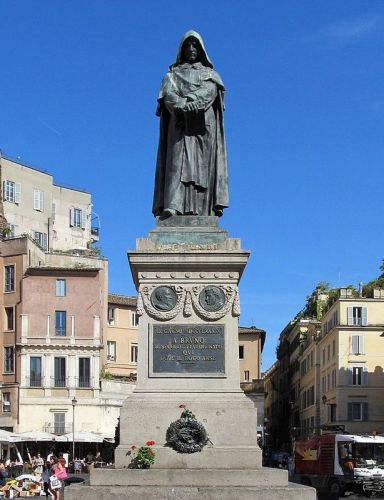
Statue of the Dominican monk Giordana Bruno on the spot where he was burned on the sta-ke in the year 1600 in the squ-are Campo de 'Fiori in Rome. He was executed because he sup-ported Copernicus' theory that the Earth revolves around the Sun and not the other way a-round, as the Catholic Church believed. Photo by daryl mit-chell from Saskatoon, Saskat-chewan, Canada Wikipedia.
Faithful to his father and Jeremy Bentham's utilitarianism he does not support his position on natural freedom rights or the like, but only on that men will be happier when they have the opportunity to live their lives as they wish. Individual freedom will thus contribute to "the greatest possible happiness for the greatest possible number of people"..
Mill advocates individualism in the sense that individuals must have the freedom to live their lives as they wish in accordance with their opinions without being subjected to legal punishment or social stigma. Simply, the individual must not unreasonably harm others' opportunities to live their lives as they would like: "The liberty of the individual must be thus far li-mited; he must not make himself a nuisance to other people. But if he re-frains from molesting others in what concerns them, and merely acts ac-cording to his own inclination and judgment in things which concern himself, the same reasons which show that opinion should be free, prove also that he should be allowed, without molestation, to carry his opinions into practice at his own cost."
In Chapter 4 of "On Liberty", John Stuart Mill leads a passionate attack on the democratic mediocrity of his own time, which he believes will lead to the downfall of Great Britain. In the attack, elements of future philosophies can be recognized: Existentialism, Nietzsche's übermensch and Marxism.
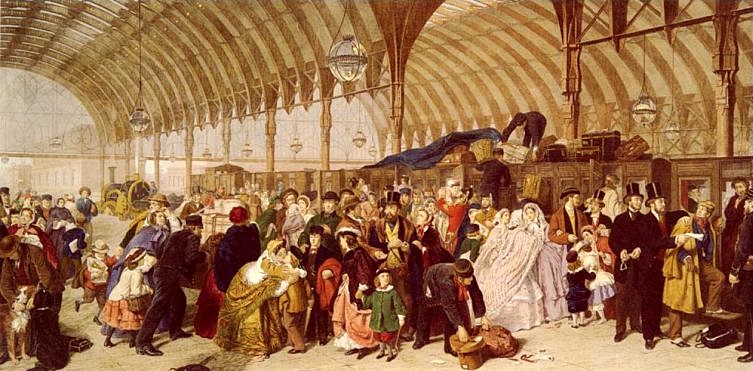
The Railway Station - probably Paddington - painted by William Po-well Frith in 1862. People's life at a London railway station in Victorian times. Photo Branch.
He criticizes his contemporaries for mediocrity: "At present individuals are lost in the crowd. In politics it is almost a triviality to say that public opinion now rules the world. The only power deserving the name is that of masses, and of governments while they make themselves the organ of the tendencies and instincts of masses."
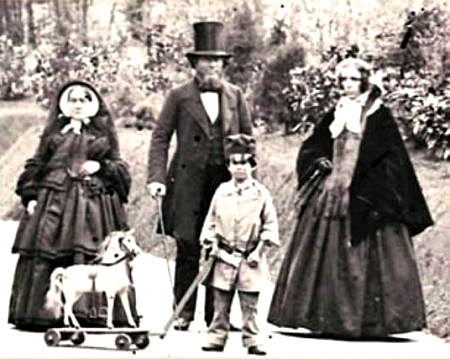
Wealthy English family in the Victorian era. Photo Victorian Era in British History.
We can recognize a budding existentialism in: "The hu-man faculties of perception, judgment, discriminative feeling, mental activity, and even moral preference, are exercised only in making a choice. He who does any-thing because it is the cu-stom, makes no choice." - "He who lets the world, or his own portion of it, choose his plan of life for him, has no need of any ot-her faculty than the ape-like one of imitation. He who chooses his plan for himself, employs all his faculties. He must use observation to see, reason-ing and judgment to foresee, activity to gather materials for decision, dis-crimination to decide, and when he has decided, firmness and self-control to hold to his deliberate decision."
And we can see the outline of Nietzsche's übermensch: "Yet desires and impulses are as much a part of a perfect human being, as beliefs and re-straints: and strong impulses are only perilous when not properly balanced; when one set of aims and inclinations is developed into strength, while ot-hers, which ought to coexist with them, remain weak and inactive."
Which make us think of Lloyd Georges' remark about Winston Churchill: "Poor Winston - A brilliant fellow without judgment which is adequate to his fierce impulses. His steering gear is too weak for his horse-power"
Mill explains the potential übermensch somewhat more rationally than later Nietzsche "Strong impulses are but another name for energy. Energy may be turned to bad uses; but more good may always be made of an energetic nature, than of an indolent and impassive one. Those who have most na-tural feeling, are always those whose cultivated feelings may be made the strongest." - "there are but few persons, in comparison with the whole of mankind, whose experiments, if adopted by others, would be likely to be any improvement on established practice. But these few are the salt of the earth; without them, human life would become a stagnant pool. Not only is it they who introduce good things which did not before exist; it is they who keep the life in those which already existed."
Mill rejects traditional culture and traditional customs as worthless and anti-cipates thereby partially Marxism, which wants to destroy everything old and create the new, perfect communist society and human completely from the bottom using terror and propaganda. He writes: "Where, not the person's own character, but the traditions of customs of other people are the rule of conduct, there is wanting one of the principal ingredients of human happi-ness, and quite the chief ingredient of individual and social progress." - Namely, individualism.
He also expresses in several other places that he believes that culture and ways of life handed down from the ancestors stand in the way of progress: "The majority, being satisfied with the ways of mankind as they now are (for it is they who make them what they are), cannot comprehend why those ways should not be good enough for everybody."
Mill was a very intelligent man. He sensed existentialism, while Kirkegaard was still a relatively unknown original in Copenhagen. He could describe the übermensch, while Nietzsche was still a schoolboy in the Prussian Saxony and he anticipated parts of Marxism, though he only possible transiently had heard of a shabby revolutionary of Jewish descent sitting in the reading room of the British Museum and writing furiously.
But miraculously, the very greatest individualists who were to change hu-man life beyond recognition had gone under his radar - namely, the ingeni-ous inventors, engineers, and manufacturers of the Industrial Revolution, who lived and worked in England in his day. He simply wrote: " But we are progressive as well as changeable: we continually make new inventions in mechanical things, and keep them until they are again superseded by bet-ter."
Mill notes that action should not be as free as opinions, and must be limited when they will harm others. He writes: "Even opinions lose their immunity, when the circumstances in which they are expressed are such as to con-stitute their expression a positive instigation to some mischievous act. An opinion that corn-dealers are starvers of the poor, or that private property is robbery, ought to be unmolested when simply circulated through the press, but may justly incur punishment when delivered orally to an excited mob as-sembled before the house of a corn-dealer, or when handed about among the same mob in the form of a placard."

Portrait of the religious reformer John Calvin 1509-1564. Photo Biography.
Mill is rich in words but poor in ex-amples, and it can be difficult to see what he specifically means. But in his critique of Calvin's Christianity one senses the outline of Rous-seau's battle cry "Back to Nature," probably motivated by his own harsh childhood: "It is so, on the Calvinistic theory. According to that, the one great offence of man is Self-will. All the good of which hu-manity is capable, is comprised in Obedience. You have no choice; thus you must do, and no otherwise; "whatever is not a duty is a sin." Hu-man nature being radically corrupt, there is no redemption for any one until human nature is killed within him. To one holding this theory of life, crushing out any of the human faculties, capacities, and susceptibilities, is no evil: man needs no capacity, but that of surrendering himself to the will of God: and if he uses any of his faculties for any other purpose but to do that sup-posed will more effectually, he is better without them. That is the theory of Calvinism; and it is held, in a mitigated form, by many who do not consider themselves Calvinists.
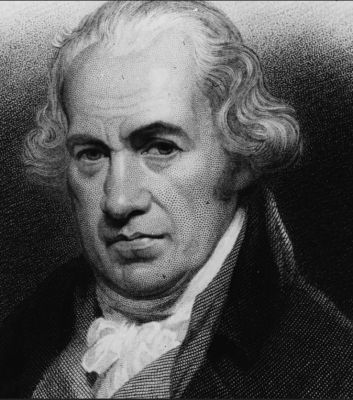
The Scottish inventor James Watt (1759-1818) effectively invented the steam en-gine, which enabled steam-powered machi-nes in factories, railways, steamships, steam-powered pumps and steam excavators.
Mill wonder why God gave man all these e-motions, instincts and inclinations, that are drivers for individualism and that Calvin would clean out. God must have had an intention that the urges that he himself had created should be used for something. Mill writes: "It is not by wearing down into uniformity all that is individual in themselves, but by cultivating it and calling it forth, within the limits imposed by the rights and interests of others, that human beings become a noble and beautiful object of contemplation."
He describes the nature of public opinion: "a person may without blame, eit-her like or dislike rowing, or smoking, or music, or athletic exercises, or chess, or cards, or study, because both those who like each of these things, and those who dislike them, are too numerous to be put down. But the man, and still more the woman, who can be accused either of doing "what no-body does," or of not doing "what everybody does," is the subject of as much depreciatory remark as if he or she had committed some grave moral delinquency."
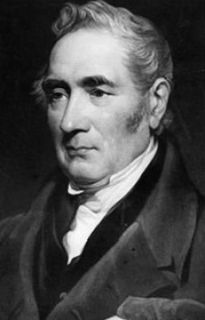
Inventor of the railway locomotive George Step-henson 1781-1848 was born in Wylam, Northumber-land. He was the second child of Robert and Ma-bel Stephenson, neither of whom could read or write. He was a mechanical genius. As a 17-year-old, he became an engineer at the Water Row Pit in Newburn. George realized the value of educa-tion and paid to attend evening school to learn reading, writing and arithmetic - he was illi-terate until he was 18 years old.
He does not believe that changing fashions is an ex-pression of individualism. "We have discarded the fix-ed costumes of our forefathers; every one must still dress like other people, but the fashion may change once or twice a year. We thus take care that when there is change, it shall be for change's sake, and not from any idea of beauty or convenience; for the same idea of beauty or convenience would not strike all the world at the same moment, and be simultaneously thrown aside by all at another mo-ment."
Mill argues that the modern age (19th century) as opposed to the Middle A-ges tends to diminish individualism and encourage mediocrity, he associa-tes this tendency with the democratization of culture and government: "Comparatively speaking, they now read the same things, listen to the same things, see the same things, go to the same places, have their hopes and fears directed to the same objects, have the same rights and liberties, and the same means of asserting them."
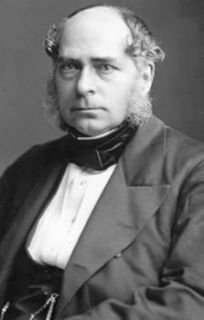
Henry Bessemer, inventor of the Bessemer oven, which made it possible to produce steel in large quantities, relatively cheaply, for railway rails and plates and profiles for, among other things, steel ships.
In his time, the Industrial Revolution was still in full bloom in England. It would have been fitting, if he had mentioned all the fantastic and creative inventions made by contemporary English inventors, engineers and manufacturers, which were to come to change the world, and which were largely driven by individu-alism. In the chapter on individualism he contented himself with writing: "There is now scarcely any outlet for energy in this country except business."
It is also appropriate to add that the individualism that was characteristic of the English inventors, not only increased the "greatest happiness of the greatest number" by virtue of the inventors feeling more happy because they could realized their individualism, but they also greatly added happi-ness and thus utility by virtue of their new machines saving manual labor and the increased amount of useful products must be assumed to have contributed to all people's sense of happiness and thus to "the greatest possible utility"..
5. PRO Demokrati
Mill downplays the value of handed down culture and thereby partially anticipates Marxism. He writes a-bout the - in his opinion - confor-mist majority: "The majority, being satisfied with the ways of mankind as they now are (for it is they who make them what they are), cannot comprehend why those ways should not be good enough for everybody."
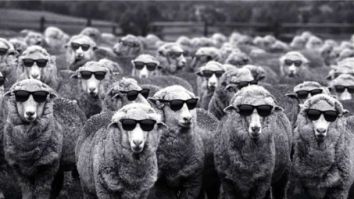
Mill: "Comparatively speaking, they now read the same things, listen to the same things, see the same things, go to the same places, have their hopes and fears directed to the same ob-jects" Foto Pinterest.
A marketplace of ideas - or rather a mess - where fake news is mar-keted together with factual truth and where conspiracy theories are equated with scientific facts will on-ly create a lot of noise and excite-ment, and there will come no use-ful basis for action from that.

The marketplace of ideas. Photo Secure DeFi Etherum Platform.
A marketplace of ideas will simply drown the truth in a myriad of pe-culiar messages..
The argument for the marketplace of ideas presupposes that words are used only in their descriptive, logical or semantic meaning. But in politics, and most clearly by popu-list politicians, language is mainly used to evoke emotions which di-vert attention from the factual facts. Therefore, it is completely ir-responsible to just open the doors and let any so-called information be allowed.

The marketplace of ideas. Photo Effective Leadership State Te.
In addition, there is a fierce com-petition in the media market. There are several television channels and several nationwide newspa-pers. It is a pure conspiracy story that all the major media should agree on what information the people can stand to hear and what is better to conceal.
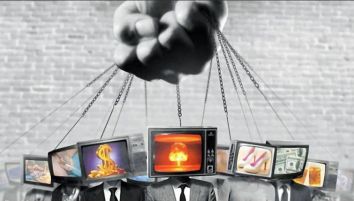
Main stream media. Photo Yandex Zen.
CONTRA Demokrati
It is not true that a precondition for individualism and development is to reject traditional culture and ways of life inherited throughout hi-story.
Mills' almost contemporaries Ja-mes Watt, George Stephenson, Henry Bessemer, and many other engineers and manufacturers were the real individualists who, with their deep-seated interest, concen-tration, and willingness to carry out their projects, dramatically impro-ved people's living conditions.

The Bessemer oven at the Kelham Island Industrial Museum. Photo Oxyman Wikipedia.
There is no evidence that they should have exhibited deviant be-havior and dressing as an expres-sion of individualism. By all ac-counts, they loved their homeland and appreciated a traditional hearty "English breakfast" and a "nice cup of tea", while immersed in problems with steam pressure, mechanical fittings and heatresi-stant linings.
A marketplace of ideas and attitu-des with lively supply and demand, where all ideas - probable and un-likely - will be tested against a re-lentless argumentation, will seem chaotic, but out of chaos will come the victorious truth, and it will cre-ate a optimal societal development - because thus only the best and truest ideas would survive.
Stamping some ideas and attitu-des as fake news and conspiracy theories and proclaiming other the-ories and reports to be factual truth and scientific facts is just propa-ganda to justify the censorship. "Po-pulism" is also nothing but a sticker that politically correct poli-ticians put on their opponents so that they do not have to answer them with actual arguments.
In a democracy, it is the people - the voters - who must make the important decisions, and therefore the people must have all informa-tion presented, and they must themselves assess what informa-tion is fake news and what is truth.
In the case of guardians, who, on the basis of their own criteria, so-vereignly select what information the people should know, it is no longer a democracy.
Magically brings all mainstream media always the same news. All media agree that man-made CO2 creates global warming. All media agree that the Muslim immigration creates much-needed diversity. How absurd as it will sound for po-sterity all media the last five years every day have brought a highly critical and derogatory Trumf hi-story.
6. Restriction of Authority of Society over Individuals
John Stuart Mill begins his chapter on the limits of society's authority over individuals: "What then, is the rightful limit to the sovereignty of the indivi-dual over himself? Where does the authority of society begin? How much of human life should be assigned to individuality, and how much to society?"
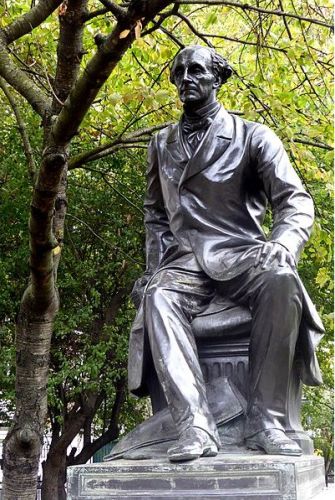
Statue of John Stuart Mill in the Victoria Embankment in London. Photo Wikipedia Commons.
Mill is not a supporter of the social con-tract, he says, but believes that the indi-vidual has obligations to society: "every one who receives the protection of so-ciety owes a return for the benefit" - "each should be bound to observe a certain line of conduct towards the rest. This conduct consists, first, in not in-juring the interests of one another; or rather certain interests, which, either by express legal provision or by tacit under-standing, ought to be considered as rights; and secondly, in each person's bearing his share (to be fixed on some equitable principle) of the labors and sacrifices incurred for defending the society or its members from injury and molestation."
But neither society nor parts of it should decide how the individual should live his life, provided he does not harm others: "But neither one person, nor any number of persons, is warranted in saying to another human creature of ripe years, that he shall not do with his life for his own benefit what he choo-ses to do with it. He is the person most interested in his own well-being, the interest which any other person, except in cases of strong personal attach-ment, can have in it, is trifling. Apparently he thinks that, for example, spou-ses, children and parents may also have a word to say in relation to a per-son's private life in some cases.
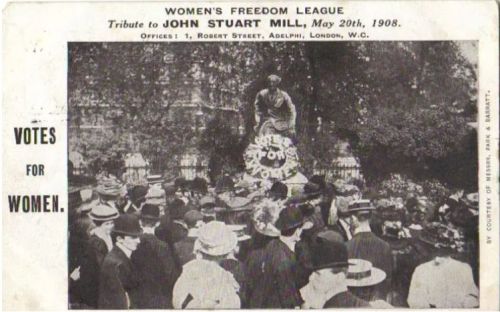
Freedom-loving women from the Women's Freedom League pay tribute to their hero John Stuart Mill in 1908. Photo Woman and her Sphere. Photo Woman and her Sphere.
Although society does not directly intervene if a person chooses to live his life in a strongly divergent way, then this person must accept that others may have less flattering opinions about his way of living: "A per-son who shows rashness, obstinacy, self-conceit - who cannot live within moderate means - who cannot restrain himself from hurtful indulgences - who pursues animal pleasures at the expense of those of feeling and intel-lect - must expect to be lowered in the opinion of others, and to have a less share of their favorable sentiments, but of this he has no right to complain."
Mill continues: "What I contend for is, that the inconveniences which are strictly inseparable from the unfavorable judgment of others, are the only ones to which a person should ever be subjected for that portion of his con-duct and character which concerns his own good, but which does not affect the interests of others in their relations with him."
But "Acts injurious to others require a totally different treatment. Encroach-ment on their rights; infliction on them of any loss or damage not justified by his own rights; falsehood or duplicity in dealing with them; unfair or ungene-rous use of advantages over them; even selfish abstinence from defending them against injury--these are fit objects of moral reprobation, and, in grave cases, of moral retribution and punishment."
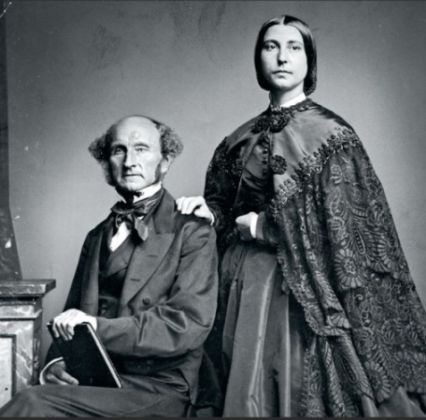
John Stuart Mill and his stepdaughter Helen Taylor. Photo "En feministisk grundtekst".
In the question of in which ca-ses society should intervene against a person, who harms himself, Mill is relatively spe-cific to a change: "I fully admit that the mischief which a per-son does to himself, may se-riously affect, both through their sympathies and their in-terests, those nearly connec-ted with him, and in a minor degree, society at large. When, by conduct of this sort, a per-son is led to violate a distinct and assignable obligation to any other person or persons, the case is taken out of the self-regarding class, and becomes amenable to moral disapprobation in the proper sense of the term."
"If, for example, a man, through intemperance or extravagance, becomes unable to pay his debts, or, having undertaken the moral responsibility of a family, becomes from the same cause incapable of supporting or educating them, he is deservedly reprobated, and might be justly punished; but it is for the breach of duty to his family or creditors, not for the extravagance."
"If the resources which ought to have been devoted to them, had been di-verted from them for the most prudent investment, the moral culpability would have been the same. George Barnwell murdered his uncle to get mo-ney for his mistress, but if he had done it to set himself up in business, he would equally have been hanged."

The Muslim ban on pork has long been known in the Middle East. Herodot-us writes about Egypt in "Histories" about 450 years before our time - more than a thousand years before anyone had thought of Muhammad - "The pig is regarded a-mong them as an unclean animal, so much so that if a man in passing accidentally touch a pig, he instantly hurries to the river, and plunges in with all his clothes on." Photo: Min planet.
Mill cites six examples of governments or dominant public opinions that he believes represent unduly interfering in the personal lives of the country's residents.
"To cite a rather trivial example, nothing in the creed or practice of Christi-ans does more to envenom the hatred of Mahomedans against them, than the fact of their eating pork. There are few acts which Christians and Euro-peans regard with more unaffected disgust, than Mussulmans regard this particular mode of satisfying hunger." - "Suppose now that in a people, of whom the majority were Mussulmans, that majority should insist upon not permitting pork to be eaten within the limits of the country. This would be nothing new in Mahomedan countries. Would it be a legitimate exercise of the moral authority of public opinion?"
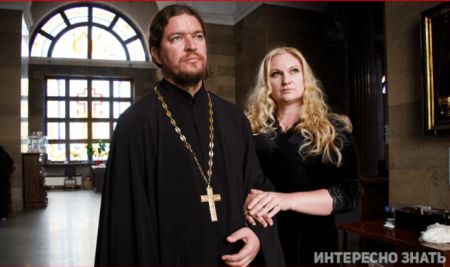
Married Russian Orthodox priest. "Photo Iznat.com.
"To come somewhat nearer home: the majority of Spa-niards consider it a gross impiety, offensive in the highest degree to the Supre-me Being, to worship him in any other manner than the Roman Catholic; and no ot-her public worship is lawful on Spanish soil. The people of all Southern Europe look upon a married clergy as not only irreligious, but unchaste, indecent, gross, disgusting. What do Protestants think of these perfectly sincere feelings, and of the at-tempt to enforce them against non-Catholics?"
"Wherever the Puritans have been sufficiently powerful, as in New England, and in Great Britain at the time of the Commonwealth, they have endeavor-ed, with considerable success, to put down all public, and nearly all private, amusements: especially music, dancing, public games, or other assembla-ges for purposes of diversion, and the theatre."
"There are still in this country large bodies of persons by whose notions of morality and religion these recreations are condemned; and those persons belonging chiefly to the middle class, who are the ascendant power in the present social and political condition of the kingdom, it is by no means im-possible that persons of these sentiments may at some time or other com-mand a majority in Parliament. How will the remaining portion of the com-munity like to have the amusements that shall be permitted to them regula-ted by the religious and moral sentiments of the stricter Calvinists and Methodists?"

Illegal alcohol is poured into the ditch in the United States in the 1920's. The ban was introduced in 13 states. Among other things, the pharmacies supported the ban, as they experienced a boom in the sale of an invigorating tonic medicine containing Co-lombian coca (cocaine was not banned at this time).
It is said that in three years was achieved:
- Significantly improved health.
- Three times fewer arrests.
- Arrest cells were empty.
- People's well-being was improved.
- People started drinking more milk.
- Savings increased.
Photo Forex Deng.
"To imagine another contingency, perhaps more likely to be realized than the one last mentioned." - "It is affirmed that in the country where this ten-dency is most completely realized--where both society and the government are most democratic--the United States--the feeling of the majority, to whom any appearance of a more showy or costly style of living than they can hope to rival is disagreeable, operates as a tolerably effectual sumptuary law, and that in many parts of the Union it is really difficult for a person possessing a very large income, to find any mode of spending it, which will not incur po-pular disapprobation."
Prohibition of alcohol is also a way in which a majority can impose on a mi-nority its way of life: "Under the name of preventing intemperance the peop-le of one English colony, and of nearly half the United States, have been in-terdicted by law from making any use whatever of fermented drinks, except for medical purposes."

Mormon big family." Photo a-News.
He mentions the mormons as example: "I cannot refrain from adding to these ex-amples of the little account commonly made of human liberty, the language of downright persecution which breaks out from the press of this country, whenever it feels called on to notice the remarkable phenome-non of Mormonism. Much might be said on the unexpected and instructive fact, that an alleged new revelation, and a religion, founded on it, the pro-duct of palpable imposture, not even supported by the prestige of extra-ordinary qualities in its founder, is believed by hundreds of thousands, and has been made the foundation of a society, in the age of newspapers, rail-ways, and the electric telegraph." - "What here concerns us is, that this re-ligion, like other and better religions, has its martyrs; that its prophet and founder was, for his teaching, put to death by a mob; that others of its ad-herents lost their lives by the same lawless violence; that they were forcibly expelled, in a body, from the country in which they first grew up; while, now that they have been chased into a solitary recess in the midst of a desert, many in this country openly declare that it would be right (only that it is not convenient) to send an expedition against them, and compel them by force to conform to the opinions of other people."
"The article of the Mormonite doctrine which is the chief provocative to the antipathy which thus breaks through the ordinary restraints of religious to-lerance, is its sanction of polygamy; which, though permitted to Mahome-dans, and Hindoos, and Chinese, seems to excite unquenchable animosity when practised by persons who speak English, and profess to be a kind of Christians."

Cover of the book "Irreversible Damage - The Transgender Craze Seducing Our Daugh-ters by Abigal Shrier." Photo Wikipedia.
Mill's main principle is that anyone can do with his own life as he sees fit, but only to the extent that it does not harm others. But he explicitly exempts children and the mentally weak from this rule: "It is, perhaps, hardly necessary to say that this doctrine is meant to apply only to human beings in the maturity of their faculties. We are not speaking of children, or of young persons below the age which the law may fix as that of manhood or womanhood. Those who are still in a state to require being taken care of by others, must be protected against their own actions as well as against external injury.
7. PRO Demokrati
If Mill had lived and been able to respond to this objection, he would have partially agreed. He did not intend to deny the just authority of a democratic majority. It must simply be the majority who must prove and make probable that their decisions are necessary and fair to the society as a whole.
He would have argued that in any disagreement between the state and an individual or group of indi-viduals, it is not these individuals who must prove that their actions have no harmful effects for the whole society, it is the majority who must prove that this behavior is harmful to society as a whole.

A man becomes a woman. Photo Live Journal
In modern times, the shocking dis-covery has been made that some boys are in fact girls who are trap-ped in a boy's body, and some girls are in fact boys who have - by a biological accident - got a comple-tely wrong body at birth.
Today, one can help these unhap-py young people at a very early age - long before they turn 18 - by offering them gender reassign-ment, legally and biologically, and thus saving them from a life in alie-nation.
Some may argue that such a gen-der reassignment is in line with Mill's principle that everyone should live his life as he wishes, as long as he does not harm others.
The Danish Council of Ethics has thus approved legal gender reas-signment for children as young as ten years old.
Mill clearly believes that society should not set limits on how the in-dividual want to live his life. For ex-ample, it is the individual's perso-nal responsibility to control his or her alcohol consumption. He belie-ves that everyone has the right to drink himself into the ditch, if he thinks it is exciting and interesting, as long as he does not thereby neglect the obligations that he has in relation to others.
But alcohol is not the only drug that exists. There is also hashish, funny pills and not to forget coca-ine.
Today, the consumption of all this is probably historically large. We hear time and time again that now customs officers in the US have seized so and so many tons in containers, submarines or under-ground tunnels - then one must think: There really is format over that trade, what about all that they do not find?

Elvis Presley (1935-1977) died at the age of 42. His widow Priscilla tells in a new HBO documentary that he well knew what his big drug abuse would lead to. Photo imgur.com.
Almost every time a famous singer or actor in the US dies, we are told that the cause of death was over-dose. In American films, one can experience that it is described that when the main characters really want to let themselves go, then it will be something with drugs. It is sometimes pictured as liberated and a kind of stand against an un-fair world.
At the recent swearing-in ceremo-ny for the new American president, the national anthem was sung by Lady Gaga, who is known as a drug user and who is friend with the president's son, who also has this problem - or has had.
The drugs seem to be everywhere - at least in the US. Customs and police cannot contain it. We must believe - and judge - that in Euro-pe, too, the amount of drugs is in-creasing everywhere.

Junkie. Foto ShurikLight Twitterissa.
Now one could imagine that the re-sponsibility for controlling this kind of consumption is transferred from the authority of society to the indi-vidual's own authority, so that the individual must control his con-sumption, as the individual men for millennia themselves have control-led their alcohol consumption. They can argue that it will be in full accordance with Mill's idea that individuals should have the free-dom to live their lives as they wish, as long as they do not harm ot-hers.
Mill's main doctrine is, as I said, that everyone should have indivi-dual freedom to live his or her life as he or she wants, as long as it does not hinder the freedom of ot-hers to live theirs as they wish. Therefore, what exactly is in the way of a man marrying several wo-men, as long as they all enter into the arrangement without coercion?
Mill writes about Mormon polyga-mi: "Still, it must be remembered that this relation is as much volun-tary on the part of the women con-cerned in it, and who may be dee-med the sufferers by it, as is the case with any other form of the marriage institution; and however surprising this fact may appear, it has its explanation in the common ideas and customs of the world, which teaching women to think marriage the one thing needful, make it intelligible that many a woman should prefer being one of several wives, to not being a wife at all."
Therefore, when both the man and several women explicitly and vo-luntarily want to live in precisely this way and it does not hurt ot-hers, who may want to live in other ways, then it must be said that this event makes them happier than they would have been without, thereby contributing to the greatest possible happiness for the greatest possible number.

Mormon-family. Photo sfw.so.
CONTRA Demokrati
Mill believed that the majority should only interfere in the affairs of a minority when their behavior is or will be detrimental to society as a whole. But this raises a difficult problem that can and probably will involve subjectivism: How can one know whether a particular behavior is or will be harmful to society as a whole? Ultimately, it will be the ma-jority that alone decides which be-haviors can be allowed and which cannot. From a real political point of view, minorities will thus only be as secure as the majority allows them to be, and there are in reality no areas of human behavior that are immune to the majority's poli-tical decisions.

A man apparently becomes a wo-man." Photo temperaturka
To influence underage boys and girls to believe that they really are of a different sex is exessive child abuse. Irreversible hormone treat-ments and surgeries will harm the children for the rest of their lives making their lives into tragedies.

Gender change operation." Foto Stolica-s.
In the real biological world, almost every species on Earth reproduce by sexual reproduction - including humans. All individuals are either male or female from birth to death. Only earthworms and snails and other very low developed animals can change sex according to the conditions.

Only very simple animals can change sex according to the circumstances - for example earthworms and snails. Photo Yandex Zen.
A boy who has his precious remo-ved by surgery does not become a woman. He just becomes a man without a penis.
A girl who has her breasts remo-ved by surgery does not become a man. She just becomes a woman without breasts.
If individuals are given full respon-sibility for themselves in relation to cocaine, funny pills, hashish and the like, it will undoubtedly cause very great inconveniences to so-ciety as a whole - which are not acceptable.

Ecstasy pills. Photo Sverige Radio.
Most of the drugs are addictive, some to an extreme degree, and an increased number of users will increase crime, as users will des-perately want to raise money for their next fix.
We will find that people around us - who otherwise look normal - be-have zombie-like unpredictably due to the psychological conse-quences of drug use - and becau-se they mostly care for their next fix.
Late effects will typically be para-noia, anxiety, confusion, depres-sion, lethargy, irritability and con-sequent indifference to other peop-le, jobs and family.
In addition, the risk of actual men-tal illness will be increased with even greater inconveniences as a result.

Cannabis Sativa, popularly cal-led the hemp plant. Photo Unge og Rusmidler.
Even use of cannabis causes let-hargy and irritability, with conse-quent inferior performance at school and at work - to the detri-ment of society as a whole.
Nature has made it so that about as many girls as boys are born and therefore there will be as ma-ny men as women. But if some more successful men are allowed to have more wives, then there will be other, less successful men, who do not get married.
The discarded men will become a source of unrest, rape and crime. In Mohammedan countries, they can become holy warriors, while in ancient China they became coolies and field workers.
If we in the Western world accept that a man can have several wi-ves, we will thus lay the ground-work for a restless and frustrated underclass of less successful un-married men, who will become a source of crime heunder rape and political unrest. This will definately not contribute to the most happi-ness for the greatest number.
Moreover, life in the harem is not as romantic as one might think. Women who rival for the love of the same man become jealous and will hate each other intensely.

A Chinese emperor with some of his wives - from a movie. Photo Dictat.net.
In Chinese history and literature, there are many stories of older wi-ves, who banded together and kil-led the youngest or the most beautiful-looking fellow-wife.
8. Litteratur
On Liberty by John Stuart Mill I UtilitarianismOn Liberty by John Stuart Mill II Utilitarianism
On Liberty by John Stuart Mill III Utilitarianism
On Liberty by John Stuart Mill IV Utilitarianism
On Liberty by John Stuart Mill V Utilitarianism
"Was Democracy just a moment? af Robert D. Kaplan The Atlantic Online
United Nations Human rights Treaty Bodies Status of Ratification United Nations Human Rights.
Rammeafgørelse om bekæmpelse af visse former for og tilkendegivelser af racisme og fremmedhad ved hjælp af straffelovgivningen Eur-Lex
Lonang Institute
The European Parliament approves temporary regulations against child sexual abuse on the Internet Pledge Times
Facebook Censorship Board Member: Free Speech Is Not A Human Right The Federalist.